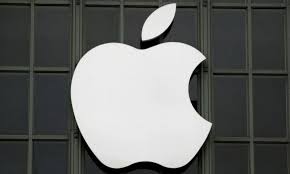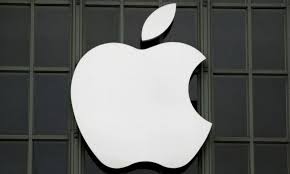
Apple Inc. forecasted more troubles on Thursday as China's COVID-19 lockdowns stymie production and demand, the war in Ukraine dampens sales, and development in services, which the iPhone manufacturer sees as its engine for expansion, slows.
In late trading, shares were down 2.2 per cent after executives expressed their pessimism on a conference call. The announcement overshadowed Apple's fiscal second quarter profit and sales, which concluded in March.
In an interview, Apple's Chief Financial Officer Luca Maestri warned that the conflict in Ukraine, which forced the company to halt sales in Russia, will hurt sales even more in the fiscal third quarter.
On the conference call, he told analysts that supply-chain concerns would reduce sales by $4 billion to $8 billion in the third quarter, which would be "significantly larger" than the hit in the second quarter.
He stated that supply issues were centred on a corridor near Shanghai, China, and represented COVID disruptions and chip shortages. The pandemic was also harming demand in China, he claimed.
Chief Executive Officer Tim Cook stated that almost all of the Chinese plants that conduct final assembly for Apple products have reopened following previous COVID shutdowns, but the company is not estimating when the chips shortage, which is primarily affecting older devices, will end.
Cook expressed hope that COVID difficulties will be "transitory" and "become better over time."
According to at least one analyst, the outlook is unclear.
"We were all looking for just better guidance on what is really going on over there (China) ... and that didn't come out," said Louis Navellier, chief investment officer for Navellier & Associates.
Despite Apple's supply chain management in the March quarter, Kim Caughey Forrest, Chief Investment Officer of Bokeh Capital Partners, stated that continuous demand remained a major concern.
Other high-profile tech firms have expressed similar worries. Amazon released a poor outlook on Thursday after being swamped by increasing costs, sending its shares down 9 percent after the close, and Intel Corp anticipated a bleak quarter due to supply chain concerns, sending its stock down 4 percent.
Both businesses, along with Apple, are constituents of the Nasdaq, which has dropped roughly 19 per cent this year as rising inflation drives investors away.
According to Refinitiv, Apple's overall fiscal second-quarter sales was $97.3 billion, up 8.6 percent from the previous year and higher than analysts' average expectation of $93.89 billion.
Worldwide phone sales income was $50.6 billion, a 5.5 percent rise over the previous year, while services revenues increased 17 percent to $19.8 billion, both of which exceeded analyst average projections.
Maestri, on the other hand, predicted that service growth would slow from the March quarter but remain in the double digits. He highlighted a number of causes, including higher currency exchange rates.
Profit was $25 billion, or $1.52 per share, substantially exceeding analysts' projections of $23.2 billion and $1.43 per share.
Apple also increased its dividend by 5% to $0.23 per share, and the board authorised a $90 billion share buyback.
Investors are prepared for a reduction in consumer spending on computer gadgets and services as the Ukraine conflict and other reasons drive up the cost of oil, food, and other basics.
Cook dismissed an analyst's query about inflation and consumers.
"We're monitoring that closely. But right now, our main focus, frankly speaking, is on the supply side," he said.
In response to a question concerning rising inflation, Maestri stated that demand, particularly for iPhones, had been higher than the business had anticipated at the start of the quarter. However, he highlighted that inflation was having an effect on expenses.
Other businesses have profited from the pandemic, notably the shift to hybrid work.
Apple reported that iPad sales declined 2 percent to $7.65 billion owing to supply-chain difficulties, while income from Mac computers increased 14.7 per cent to $10.4 billion.
Wearables, home speakers, and accessories sales increased 12 per cent to $8.8 billion, but were the only item to fall short of Wall Street expectations. Maestri stated that the Watch and AirPods sold well, and that the shortfall was due to seasonal variations in demand for other accessories.
Apple said it now has 825 million paying subscribers across its at least seven subscription offerings, up by 40 million from 785 million last quarter. Its growth comes as rivals such as Netflix Inc report subscriber losses.
(Source:www.cgtn.com)
In late trading, shares were down 2.2 per cent after executives expressed their pessimism on a conference call. The announcement overshadowed Apple's fiscal second quarter profit and sales, which concluded in March.
In an interview, Apple's Chief Financial Officer Luca Maestri warned that the conflict in Ukraine, which forced the company to halt sales in Russia, will hurt sales even more in the fiscal third quarter.
On the conference call, he told analysts that supply-chain concerns would reduce sales by $4 billion to $8 billion in the third quarter, which would be "significantly larger" than the hit in the second quarter.
He stated that supply issues were centred on a corridor near Shanghai, China, and represented COVID disruptions and chip shortages. The pandemic was also harming demand in China, he claimed.
Chief Executive Officer Tim Cook stated that almost all of the Chinese plants that conduct final assembly for Apple products have reopened following previous COVID shutdowns, but the company is not estimating when the chips shortage, which is primarily affecting older devices, will end.
Cook expressed hope that COVID difficulties will be "transitory" and "become better over time."
According to at least one analyst, the outlook is unclear.
"We were all looking for just better guidance on what is really going on over there (China) ... and that didn't come out," said Louis Navellier, chief investment officer for Navellier & Associates.
Despite Apple's supply chain management in the March quarter, Kim Caughey Forrest, Chief Investment Officer of Bokeh Capital Partners, stated that continuous demand remained a major concern.
Other high-profile tech firms have expressed similar worries. Amazon released a poor outlook on Thursday after being swamped by increasing costs, sending its shares down 9 percent after the close, and Intel Corp anticipated a bleak quarter due to supply chain concerns, sending its stock down 4 percent.
Both businesses, along with Apple, are constituents of the Nasdaq, which has dropped roughly 19 per cent this year as rising inflation drives investors away.
According to Refinitiv, Apple's overall fiscal second-quarter sales was $97.3 billion, up 8.6 percent from the previous year and higher than analysts' average expectation of $93.89 billion.
Worldwide phone sales income was $50.6 billion, a 5.5 percent rise over the previous year, while services revenues increased 17 percent to $19.8 billion, both of which exceeded analyst average projections.
Maestri, on the other hand, predicted that service growth would slow from the March quarter but remain in the double digits. He highlighted a number of causes, including higher currency exchange rates.
Profit was $25 billion, or $1.52 per share, substantially exceeding analysts' projections of $23.2 billion and $1.43 per share.
Apple also increased its dividend by 5% to $0.23 per share, and the board authorised a $90 billion share buyback.
Investors are prepared for a reduction in consumer spending on computer gadgets and services as the Ukraine conflict and other reasons drive up the cost of oil, food, and other basics.
Cook dismissed an analyst's query about inflation and consumers.
"We're monitoring that closely. But right now, our main focus, frankly speaking, is on the supply side," he said.
In response to a question concerning rising inflation, Maestri stated that demand, particularly for iPhones, had been higher than the business had anticipated at the start of the quarter. However, he highlighted that inflation was having an effect on expenses.
Other businesses have profited from the pandemic, notably the shift to hybrid work.
Apple reported that iPad sales declined 2 percent to $7.65 billion owing to supply-chain difficulties, while income from Mac computers increased 14.7 per cent to $10.4 billion.
Wearables, home speakers, and accessories sales increased 12 per cent to $8.8 billion, but were the only item to fall short of Wall Street expectations. Maestri stated that the Watch and AirPods sold well, and that the shortfall was due to seasonal variations in demand for other accessories.
Apple said it now has 825 million paying subscribers across its at least seven subscription offerings, up by 40 million from 785 million last quarter. Its growth comes as rivals such as Netflix Inc report subscriber losses.
(Source:www.cgtn.com)














